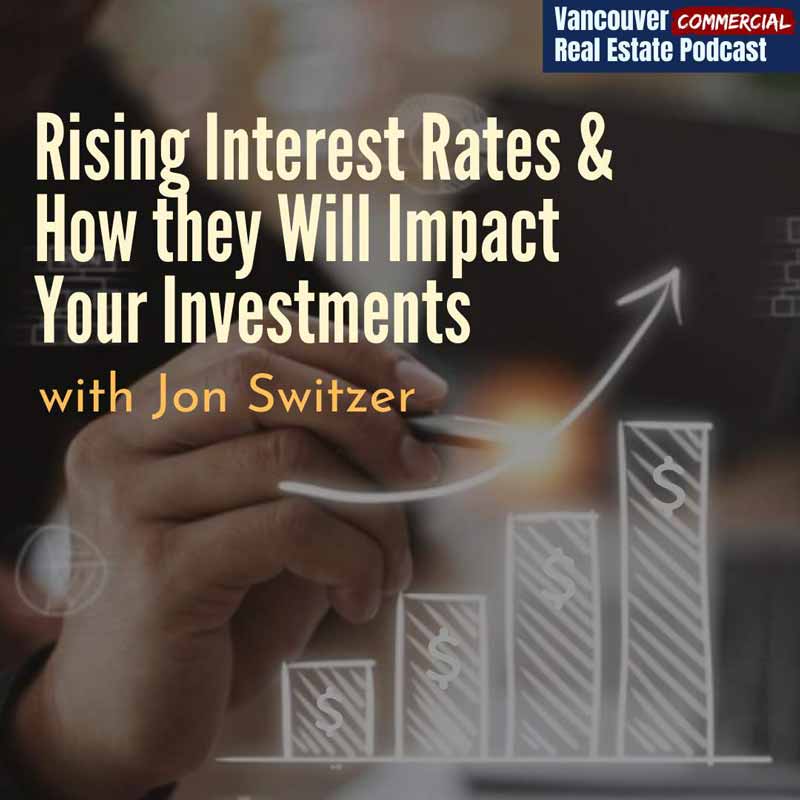
Powered by RedCircle
If you’ve been following the commercial or residential real estate markets in BC, you’ll know that the latest hot topic everyone’s talking about is the rapidly rising interest rates. In fast response, Cory and Adam have invited Jon Switzer of Impact Commercial for an emergency episode.
The Bank of Canada has sharply increased interest rates over the past few months and Jon is here to break down what’s happened, what might happen in the future, and how all this impacts the markets and your borrowing ability for your next commercial investment.
The good news is that it’s not all bad, and Jon sheds some light on how to navigate the next few months and provides some tips on what to look for in your next purchase to maximize your lending ability.
As we come out of these record low interest rates, Jon will provide you firsthand information on how to protect your investments, grow your portfolio, and where deals might be found.
I’ve been with Impact Commercial for five years. I got into commercial real estate after being in the investment world. It was the best decision I ever made. I love working with the guys and all of the clients here at Impact.
How have interest rates changed recently?
Pre-covid we were in a period of depressed growth with low 2% GDP. That was crushed pretty quickly in the spring of 2020. After the initial fears around covid subsided, there was a ton of money on the sidelines and buyers who were very bullish on the market. Combine that with record low interest rates and it created the hot real estate market we’ve seen over the last two years.
The record low overnight rate from the Bank of Canada was 0.25%, which set the stage for some of the lowest commercial mortgage rates we’ve seen in history. We were funding mortgages at the mid 2% rate and today those rates are approaching 5% for the same five-year term.
What does the overnight rate from the Bank of Canada represent?
The Canadian government influences demand by setting the overnight lending rate. It’s the rate banks will lend to each other at the end of the day to settle their accounts and meet their capital ratios.
The overnight rate represents the cheapest money out there and all other rates are set based on that. So everything from government bonds and the final mortgage rates we see are built off that overnight rate.
How is the commercial real estate market reacting to the recent interest rate hike?
There are many more sectors of commercial real estate than residential real estate, so it’s hard to answer across the entire market. For example, industrial is one of the least affected markets because there is so much demand and so little supply.
Multi-family is usually the strongest asset class in commercial real estate so it should be fairly resilient against any interest rate changes. But everything will be affected by the interest rate hike, just on a sliding scale. As always, the strong will survive.
We believe we’ll see some significant softening in the market over the next two to three years due to these hikes. I think that softness will see a lot of people on the sidelines jumping back into the market.
Is commercial real estate more resilient than residential real estate?
That’s particularly true in industrial where we have some of the lowest vacancy rates across North America here in Vancouver. In a balanced market, we’d see that rising interest rates cause cap rates to rise so that these real estate deals are still competitive with other investments out there. But because the industrial real estate market is so unusual and bulletproof, we’re not seeing that. The industrial market may soften a little bit, especially for developers who are overstretched, but it won’t be to a huge degree.
Multi-family is a more discretionary market. You have big groups who don’t have to buy unless the numbers work. Whereas industrial owner-occupiers are fighting for every square foot.
Despite everything that has happened, we have a healthy office real estate market in Vancouver. There’s not much office for sale – it’s more of a leasing environment.
The retail market will be interesting to watch. They’re saying we’ll see a major shift to more travel and service spending. There’s a lot of savings out there and it will be interesting to see where that money flows to.
How does inflation impact interest rates?
It takes a long time to fight back against inflation. We’re seeing a 30 year high inflation rate and it will take an aggressive approach from the Bank of Canada to fight it. Even before the war in Ukraine broke out, this inflation was on its way. The war has only enhanced what was already happening. Because of this inflation, we don’t think interest rates will start going down again until 2024.
We recommend that our clients look at three year fixed rates right now instead of the usual five year fixed. We think rates will come back down in the next few years and there will be a good refinancing opportunity.
One of the biggest effects of inflation will be on replacement costs. If you got into a property at a decent value, it will only be more and more expensive to replace that asset for the next 5-10 years.
Are fewer real estate transactions happening because interest rates are rising?
It’s definitely not all doom and gloom in real estate. The market is definitely being driven by people’s savings. I don’t think we’re going to see negative pricing in real estate. We’ve been going up at pretty crazy intervals, so I suspect we’ll see more balanced and moderate growth. I’m actually quite bullish on the market.
These high interest rates scare people but historically, real estate has stayed ahead of inflation. As long as you can afford to hang on to your real estate and debt service your mortgage, you should continue to do well.
What is the ideal investment strategy for a high interest rate environment? Where are people looking to buy commercial real estate?
We’re seeing a rush of new activity in tertiary markets. Markets in BC’s interior and up north have been red hot and they may stay that way since they have the cap rates to service higher mortgage payments. So yes, it’s an active market up there.
But we also have institutional money that is always shopping in major centres. That’s never going to change. They will go where big population growth is and they’re not worried about strong cash flow. If you’re looking beyond a 5-10 year timeframe, there’s not much negativity out there.
What is a loan to value ratio? How is it affected by higher interest rates?
Loan to value on a purchase is the loan amount divided by the purchase price. A year ago, we were looking at 50-55% loan to value across the Lower Mainland. So it took pretty deep pockets to get into a commercial real estate property, and even deeper pockets today. Now, we’re looking at well under 50% with the current interest rates and stable pricing.
In this case, the only thing that can go up is your mortgage payment. But we’re seeing really strong incomes and the ability to debt service a mortgage. That’s why the market is still quite strong despite rising interest rates.
Are rents going up in the Lower Mainland?
Rents have been going up rapidly in the Lower Mainland across all sectors. We’re being told by projectors to use $20-22/square foot for net rents on industrial properties, which was unheard of two years ago. The rate was $12-14 just two years ago.
The same thing is happening in multi-family with rapidly increasing rent rates. The issue is with restrictions from the Residential Tenancy Act. You can only take advantage of rising rent prices with a suite turnover. So it’s harder to project but rents are rising, especially as more immigrants come into the Lower Mainland.
Costs are going up faster than rents on the multi-family side. But we have strong owners in multi-family who can weather those storms.
Lease rates on office, retail and industrial are going up across the board. You want to make sure you’re buying a good asset in a good location because rental rates are going up every year, regardless of interest rates.
Who is most impacted by rising mortgage rates?
Those on the margins are most impacted by rising mortgage rates. If you were looking a year ago and it was tight, you may not even be a candidate today. However, I don’t think a huge percent of the market falls into this category. There are a lot of very strong businesses in the commercial real estate market.
Those holding higher, short term loans, like marginal developers or people taking on bridge loans, might be in trouble. People who were taking bigger chances might be feeling the pain, but that small percentage still won’t sway the overall market.
Is the owner-occupier market driving strata presales?
Yes, that is still happening. In industrial, lease rates have almost doubled in the last two years. So it only makes sense for end-users to put equity back into their own pockets instead of their landlord’s pockets. But it will be interesting over the next two years to see how that market develops.
Where have we seen increased commercial real estate activity in the past year?
In the past 12-18 months, we’ve gotten a lot more questions about Vancouver Island and the Okanagan. Those are large population centres that appeal to the broader market. We saw deals with 65-70% loan to value in Victoria. That’s very attractive for investors who only have to put down 30-35% in Victoria or the Okanagan instead of 50-55% in Burnaby.
What advice do you have for buyers heading into a high interest rate market?
Don’t be afraid of higher interest rates. If you know you’re getting a great deal, don’t be afraid to look at alternative lending. As long as you can look out two to three years and know you can make your payments, that’s all that matters. You just have to be able to hold on.
Find out more: impactcommercial.ca & instagram.com/vancouvercommercialmortgages
For all the curious minds interested in commercial real estate investing, grab a coffee and pull up a chair because we have exclusive stories and tips from commercial real estate brokers, investors, developers, economists, urban planners, and everyone in-between. From the successes and failures to the motivations and lessons learned, the Vancouver Commercial Real Estate Podcast is your insight into commercial real estate in Vancouver, Victoria, Kelowna, and beyond.
What's the best real estate market to invest in? What are the commercial real estate asset classes and property types? Hosted by Cory Wright, founder of William Wright Commercial, and co-hosts Adam and Matt Scalena of the Vancouver Real Estate Podcast, our podcast opens the door to real estate investing for everyone from beginner investors to experienced real estate professionals. New episodes are released every Tuesday. Follow the Vancouver Commercial Real Estate Podcast on Apple Podcasts, Spotify, Google Podcasts, or your favourite streaming platforms.

This communication is not intended to cause or induce breach of an existing agency agreement. E&OE: All information contained herein is from sources deemed reliable, and have no reason to doubt its accuracy; however, no guarantee or responsibility is assumed thereof, and it shall not form any part of future contracts. Properties are submitted subject to errors and omissions and all information should be carefully verified. All measurements quoted herein are approximate.
ⓒ William Wright Commercial Real Estate Services 2024
Proudly designed by Burst Creative